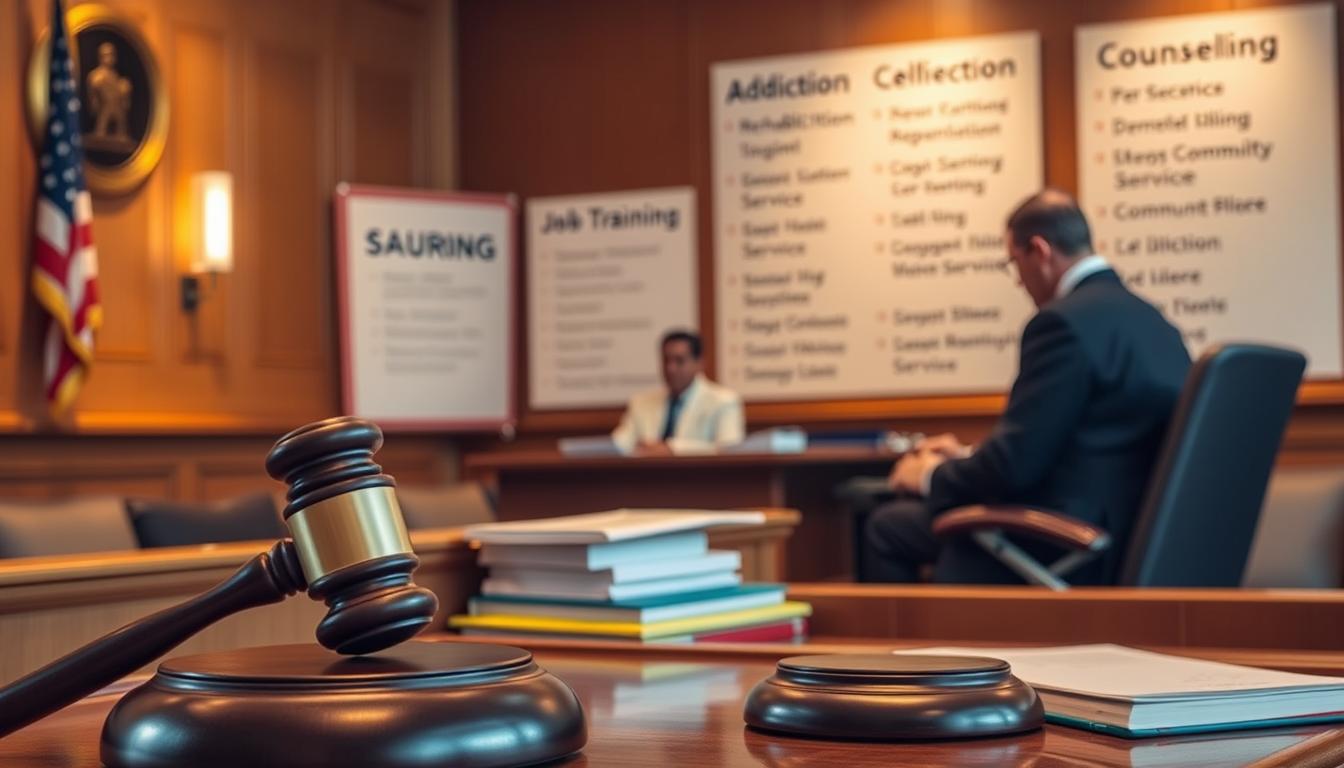Facing a shoplifting charge for the first time can be scary. Recent stats show shoplifting is a big problem for retailers in the U.S.

I’ll walk you through the shoplifting court process. You’ll learn what to expect in court and how to get ready for your appearance.
If you’re a first-time offender, knowing the court steps is key. This includes from the first charges to the final sentence.
Key Takeaways
- Understanding the shoplifting court process can help reduce anxiety and uncertainty.
- A first-time shoplifting offense may be eligible for diversion programs or reduced charges.
- The court process involves several steps, including arraignment, pre-trial hearings, and sentencing.
- Seeking professional legal advice can significantly impact the outcome of your case.
- Being prepared for your court appearance can make a positive impression on the judge.
Understanding Shoplifting Charges
Dealing with a shoplifting charge means knowing the legal terms and possible penalties. It’s important for first-time offenders to understand the legal side of things.
Legal Definition of Shoplifting
Shoplifting, or retail theft, is taking goods from a store without paying. The exact definition varies by state. It usually involves hiding merchandise, changing price tags, or tricking store staff to get goods without paying.
Classification: Misdemeanor vs. Felony
Whether shoplifting is a misdemeanor or felony depends on the stolen goods’ value and the offender’s past. For those who haven’t done it before, it’s often a misdemeanor. But, it can become a felony if the goods are very expensive or if there are past convictions.
Potential Penalties for First-Time Offenders
First-time offenders might face different penalties. These can include:
- Fines
- Probation
- Community service
- Restitution to the retailer
Knowing these possible penalties helps first-time offenders deal with the legal aftermath of shoplifting.
Initial Court Proceedings for Shoplifting Cases
The first steps in court for shoplifting cases are key. They set the stage for how the case will end. It’s important for those facing charges to know what happens next.
The Arraignment Process
The arraignment is the first time you hear the charges. You learn about your rights here. It’s where you decide how to plead.
Entering a Plea: Guilty, Not Guilty, or No Contest
Choosing how to plead is a big decision. A guilty plea means you accept the charges. A not guilty plea means you contest them. A no contest plea means you accept the punishment without admitting guilt. A criminal defense lawyer can help you decide.
Understanding Your Constitutional Rights
It’s crucial to know your rights in court. You have the right to remain silent and to an attorney. These rights protect you. A lawyer can guide you on using them.
Knowing the first steps in court helps those facing shoplifting charges. A criminal defense lawyer can offer valuable advice and support.
What Happens in Court for First Time Shoplifting: Step-by-Step
If you’re facing court for shoplifting for the first time, knowing what to expect can make a big difference. The court process can seem scary, but knowing the steps can help you feel more ready.
Court Appearance Timeline
The timeline for a court appearance for shoplifting can change based on where you are and the details of your case. Usually, after being charged, you’ll have to go to court for an arraignment. There, you’ll hear the charges against you and decide how to plead.
Key milestones in the timeline include:
- Arraignment: The first court appearance where charges are read.
- Pretrial hearings: Talks between the prosecution and defense about evidence and possible plea deals.
- Trial: If no plea deal is made, the case goes to trial.
Key Players in the Courtroom
Knowing who’s who in the courtroom can help you get through it better. The main people you’ll see are:
- The Judge: Runs the court and makes decisions on legal matters.
- The Prosecutor: Works for the state and presents the case against you.
- The Defense Attorney: Works for you and defends your rights.
Typical Duration of Proceedings
The length of shoplifting court proceedings can really vary. For first-time offenders, it might be over quickly if a plea deal is made. But if it goes to trial, it could take longer.
Things that can affect how long it takes include:
- The case’s complexity.
- The court’s schedule and how backed up it is.
- If a plea deal is made.
Understanding the court process for first-time shoplifting offenders and the shoplifting court system can help you prepare better. By knowing what to expect and who’s who, you can feel more confident in the process.
Preparing for Your Court Appearance
Facing a shoplifting charge for the first time can be scary. But being ready for court can really help. Knowing what to expect and how to act can ease your nerves.
Essential Documents to Bring
It’s key to bring all needed documents to court. These are usually:
- Identification
- Any court paperwork or summons
- Proof of insurance or financial documents
- Any documents your attorney or the court asks for
Organizing your documents in a folder or binder is smart. It keeps you organized and makes sure you don’t miss anything.
Appropriate Courtroom Attire and Behavior
Wearing the right clothes for court is important. Business casual attire is a good choice. Don’t wear too casual or revealing clothes. In court, be respectful: call the judge “Your Honor,” turn off your phone, and listen to court staff.
| Courtroom Etiquette | Description |
|---|---|
| Dress Code | Business casual |
| Addressing the Judge | “Your Honor” |
| Electronic Devices | Turned off or on silent mode |
Mental and Emotional Preparation
Getting mentally and emotionally ready is as important as getting physically ready. Spend time mentally rehearsing your court appearance. Imagine a good outcome and talk to your attorney about your worries. Deep breathing can also help calm your nerves.
Being well-prepared helps you face the court with confidence and success.
Legal Representation Options
Dealing with a shoplifting charge means making smart choices about who to represent you. It’s key to know your options and what they mean.
Public Defender vs. Private Attorney
Choosing between a public defender and a private lawyer is big. Public defenders are court-appointed for those who can’t pay for a lawyer. They’re skilled, but might not give your case as much time.
Private attorneys give you more personal service. This could lead to a defense plan that fits you better.
“The right to effective assistance of counsel is fundamental,” say legal experts. This shows how important it is to pick the right lawyer for you.
Benefits of Legal Representation for Shoplifting Cases
Having a lawyer can really change how your shoplifting case goes. A criminal defense lawyer knows the law and can talk to prosecutors. They can help lessen the bad effects of a guilty verdict.
- Understanding of legal procedures and nuances
- Negotiation with prosecutors for reduced charges or penalties
- Development of a robust defense strategy
Self-Representation: Risks and Considerations
Going it alone in court is possible, but risky for shoplifting cases. Without legal training, you might miss important details. The penalties for a guilty verdict are serious, making a lawyer a good investment.
In summary, when you’re charged with shoplifting, think hard about who will represent you. Whether it’s a public defender or a private lawyer, having a professional can greatly affect your case’s outcome.
Potential Outcomes and Sentencing
Understanding the court system for a first-time shoplifting charge is key. The court’s decision depends on several factors. These include the offense’s severity, the offender’s past, and local laws.
Diversion Programs for First-Time Offenders
First-time shoplifters might join a diversion program. These programs aim to help offenders instead of punishing them. They often include counseling, community service, or making things right.
Probation Terms and Conditions
If not a diversion program, offenders might get probation. Probation terms can change but usually include regular meetings with a probation officer. They might also have to follow specific laws and do community service or pay back what was lost.

Fines and Restitution
Fines and restitution are common in shoplifting sentences. Fines are money paid to the state. Restitution goes to the victim, like the store, to cover losses. The amount depends on the case and where it happened.
Community Service Requirements
Community service is another option for first-time offenders. It means doing work that helps the community, watched by a court officer. The kind and length of service can differ a lot.
Knowing these possible outcomes helps first-time offenders get ready for court. It also helps them decide on legal help and their overall plan.
- Courts consider various factors when determining sentencing for first-time shoplifting offenders.
- Diversion programs offer an alternative to traditional sentencing, focusing on rehabilitation.
- Probation terms can include regular check-ins and compliance with specific conditions.
- Fines and restitution are used to penalize the offender and compensate the victim.
- Community service is a common requirement that benefits the community.
State Variations in Shoplifting Laws
Shoplifting laws differ across the United States. Each state has its own rules, affecting how cases are handled in court. This is true, even for first-time offenders.
Threshold Amounts for Felony Charges
The value of stolen goods can change a misdemeanor to a felony. For example, some states make it a felony if the goods are worth over $500. Others require a higher value, like $1,000 or more.
| State | Threshold Amount for Felony |
|---|---|
| California | $950 |
| Texas | $2,500 |
| New York | $1,000 |
Differences in Sentencing Guidelines
Sentencing for shoplifting also varies by state. Some places have stricter rules, like longer probation or community service. For example, a first-time offender might get a light sentence in one state but harsher penalties in another.
“The sentencing guidelines for shoplifting can be quite different from one state to another, making it crucial for defendants to understand the specific laws in their jurisdiction.”
How Local Jurisdictions Handle First Offenses
Even within states, local areas can handle first-time shoplifting offenses differently. Some might offer special programs or sentences, while others could be stricter. Knowing these local rules is key to navigating the court system well.
Diversion Programs and Alternative Sentencing
Diversion programs offer a different path than usual sentencing for first-time shoplifters. They aim to keep individuals from getting a criminal record. This is done by completing certain tasks or joining specific programs.

Retail Theft Programs
Many places have retail theft programs as a diversion choice. These programs usually ask for restitution to the retailer, community service, or a theft prevention seminar. By doing these, people can dodge a criminal record.
Deferred Prosecution Options
Deferred prosecution is another option for some. It means delaying the case while the person does certain tasks, like counseling or community service. If they meet the conditions, the charges might be dropped.
Eligibility Requirements and Application Process
Who can join diversion programs varies by place. Usually, first-time offenders with no past crimes are eligible. To apply, you need to ask the court or prosecutor’s office for a chance. It’s wise to talk to a lawyer to know what’s needed in your area.
Long-Term Consequences of a Shoplifting Conviction
A shoplifting conviction can change your life in big ways. It’s not just about the immediate penalties. Knowing the long-term effects is key for those facing their first charge.
Criminal Record Implications
A criminal record from shoplifting can affect many areas of your life. It’s something employers, landlords, and others can see when they do background checks.
- It might make it hard to find jobs, like those needing high security clearance.
- It could make it tough to get a place to live, as landlords might see it as a risk.
- Getting professional licenses might be harder or even impossible.
Employment and Housing Challenges
A criminal record can make finding work and housing tough. Employers and landlords often check backgrounds. A shoplifting conviction might make them question your trustworthiness.
Key challenges include:
- Finding certain jobs or getting promotions might be hard.
- Landlords might not want to rent to you.
- Getting professional licenses could be tough.
Impact on Future Legal Proceedings
A shoplifting conviction can also affect future legal cases. If you’re charged with another crime, the old conviction might make penalties worse.
For instance:
- Getting caught again could mean longer jail time or bigger fines.
- Prosecutors might push for harsher sentences because of your past.
In conclusion, the long-term effects of a shoplifting conviction are serious. It’s vital to get legal help to lessen these impacts. Knowing what’s at stake can help you choose the right lawyer and strategy.
Record Sealing and Expungement Options
Record sealing and expungement give people a second chance after being convicted of shoplifting. They can clear their criminal record. This can help them find jobs, get housing, and improve their life in many ways.
Eligibility Criteria for Expungement
Who can get their shoplifting conviction expunged varies by state. Usually, first-time offenders have a better chance. Other things that matter include the crime’s nature, how long ago it happened, and the person’s criminal history.
The Expungement Process
The process to expunge a conviction involves several steps. You need to file a petition with the court and provide documents. You might also have to go to a hearing. It’s crucial to follow your state’s laws and get legal help if you need it.
Benefits of Clearing Your Record
Expunging your record can bring many benefits. It can help you get jobs, find better housing, and reduce the shame of a conviction. It can also help you regain rights lost because of the conviction.
By using record sealing and expungement, people with shoplifting convictions can start rebuilding their lives.
Conclusion
Knowing what happens in court for first-time shoplifters is key. It helps you understand the legal steps ahead. The process includes initial court actions, possible outcomes, and sentencing.
The court focuses on the offense’s severity and the right penalty. Knowing what to expect helps you prepare and make smart choices. You might look into diversion programs or alternative sentences.
The court process might seem scary, but with the right help, you can get through it. Learning about first-time shoplifting cases in court is your first step towards a better outcome.
FAQ
What happens in court for first-time shoplifting?
If it’s your first time, you’ll likely face an arraignment and enter a plea. You might get probation, fines, or community service. Sometimes, you could join a diversion program.
What is the typical court process for shoplifting cases?
It starts with an arraignment and then a plea. You might go to trial or get sentenced. You could also get into diversion programs or alternative sentences.
Can I represent myself in court for a shoplifting charge?
You can try to represent yourself, but it’s not wise. Shoplifting charges are serious. A good lawyer can really help your case.
What are the potential penalties for first-time shoplifting offenders?
First-timers might face fines, probation, or community service. The punishment depends on the stolen items’ value and your past. You might also get into diversion programs.
How can I prepare for my court appearance?
Get your documents ready, dress well, and know your rights. Being mentally and emotionally ready is key to looking good in court.
What are the benefits of diversion programs for shoplifting cases?
Diversion programs offer a chance to avoid a criminal record. They include retail theft programs and deferred prosecution. It’s a way to avoid traditional sentencing.
Can a shoplifting conviction impact my future employment or housing opportunities?
Yes, a conviction can hurt your job and housing chances. Knowing how a criminal record affects you is important.
How can I clear my record after a shoplifting conviction?
You might be able to seal or expunge your record, depending on where you live. Expungement can give you a clean slate.
What are the differences in shoplifting laws between states?
Laws and sentences for shoplifting vary by state. Knowing your local laws is key to understanding your case.
